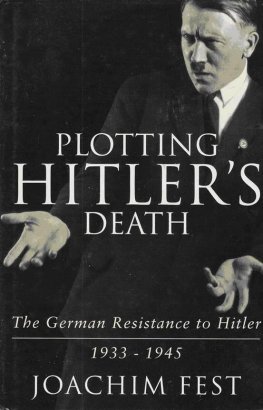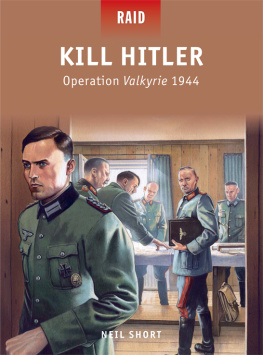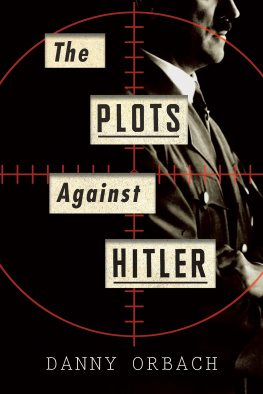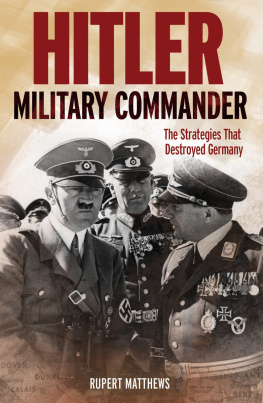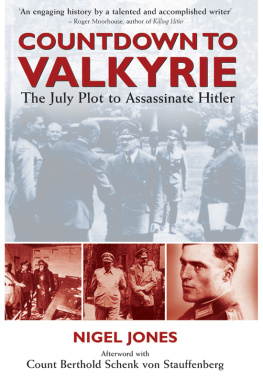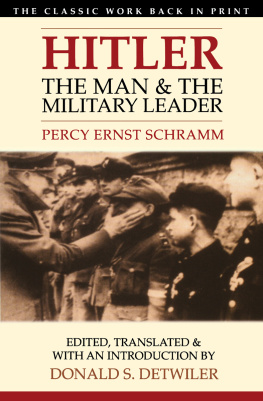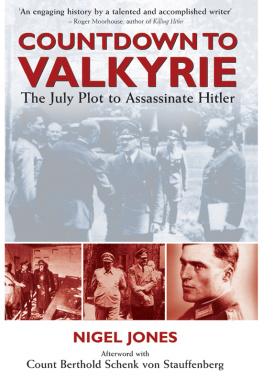Soldier in the Downfall
A Wehrmacht Cavalryman in Russia, Normandy,
and the Plot to Kill Hitler
By Baron Rudolf-Christoph von Gersdorff
Translation with Notes by Anthony Pearsall
With an Introduction by Lory Reinach, ne von Gersdorff

The Aberjona Press
Bedford, Pennsylvania
He who survives a tragedy
was not its hero.
Stanislav Jerzy Lec
Contents
by Anthony Pearsall
by Lory Reinach, ne von Gersdorff
by Klemens von Klemperer
by Baron Rudolf-Christoph von Gersdorff
The Truth About Katyn
by Brigadier General Rudolf-Christoph von Gersdorff
In memory of
the most active men
in the German resistance
Hans Oster
Henning von Tresckow
Count Claus von Stauffenberg
Translators Notes
While praising the Prussian noblemen who plotted against Hitlers life, essayist Clive James made the necessary point that, after all, Aristocratic recruits to the SS were plentiful: promotion was rapid, and there were opportunities to ride horses. (Funding an SS equestrian team was one of Himmlers master strokes.) Most of the young officers who developed doubts about Hitler had friends who never developed any doubts at all.
This is the story of a manan aristocratic professional soldier of impeccably Aryan lineage who would have certainly been welcomed as one of Himmlers horsemen had he so chosenwho instead developed doubts and then acted upon them, despite an oath he had pronounced, despite the likelihood of failure and the contempt of those people he most valued, despite a training in obedience and loyalty that would have begun, for him, at some point before his own earliest memories.
Memories are largely what Baron Rudolf-Christoph von Gersdorff had to work with when he sat down to write his memoirs. He was by then a weary paraplegic, aging and wheelchair-bound, a dispossessed refugee from what he emphatically regarded as his eastern Heimat (native land) along the lower reaches of the Oder River, and limited in his research to such books and papers as might have been available to him as a private citizen of limited means and capacities, in the divided Germany of the mid-1970s. Fortunately his power to recollect was strong, and his life as a German soldier through 1947 had provided him with more memorable experiences than most.
He wrote in memory of three of the uniformed anti-Hitler conspirators whom he knew, namely Hans Oster, Henning von Tresckow, and Baron Claus von Stauffenbergthe three men whom another rare survivor of the conspiracy, Baron Phillip von Boeselager (who will be met in the following pages) described as being respectively the mind, the heart, and the courageous arm of the plot that culminated on 20 July 1944.
To save Germany was not granted to them; only to die for it; luck was not with them, it was with Hitler. But they did not die in vain. Just as we need air if we are to breathe, and light if we are to see, so we need noble people if we are to live. So wrote the German intellectual Ricarda Huch as she surveyed the ruins of her homeland in the spring of 1946. Clive James observed that Huch was well aware that there were other and less charismatic people in the conspiracy apart from the glamorously uniformed [nobles].... There were obscure commoners who had seen through Hitler in the beginning. What she meant by nobility was the sacrificial spirit that joined, in this one instance, the beautiful young men from the Almanach de Gotha [the genealogical bible of the German aristocracy] and the plodding minor bureaucrats from the local council.
In a much smaller way this book is the result of a similar collaboration, this one between European aristocracy and American bourgeoisie: and I would like to gratefully acknowledge Mme. Lory Reinach, ne Lory von Gersdorff, the authors friendly and gracious offspring; Professor Emeritus Klemens von Klemperer, survivor and scholar of those violent times; Mrs. Patti Bonn, owner of The Aberjona Press, for instantly taking a chance on this book; and Gayle Wurst, Ph.D., the masterful editor of the English version, and all-around inspiration. In addition my thanks are owed to the anonymous readers who vetted the text and endnotes at the publishers request. It goes without saying that I am responsible for any surviving errors. I am likewise grateful to my wife and daughters for their patience while I sat hunched over books and keyboards, engaged in this project.
This is a book by another man and not mine to dedicate; but if it were I would inscribe it to all those in every time and place who have risked that which they held most dear, up to and including their lives, out of what the Germans call Zivilkourage moral courage.
Anthony Pearsall
Pacific Grove, California, 2012
[Editors Note: German military ranks from Generalmajor up are transposed to United States usage; a German Generalmajor will be referred to as a Brigadier General, and so on.]
Introduction:
Memories of My Father
In order to describe my father, Rudolf-Christoph von Gersdorff, I must nowadays reach far back into the past. Moreover it was our fate never to live together under the same roof for longer than a few months at a time. Nonetheless, many events remain engraved in my memory.
On 9 February 1945I was seven years old at the timeI was forced to leave Schloss Matzdorf in Silesia, together with four cousins, my uncle (my fathers older brother), and my aunt. We were fleeing from the Russians. The village of Matzdorf (now known as Maciejowiec, in western Poland) lay in what was then the Prussian province of Silesia, a few miles away from the town of Hirschberg (now Jelenia Gra).
I still remember that scene, over sixty years later. In front of the manor house stood a black carriage drawn by Max and Moritz, two black horses with cropped tails, wearing dark blinkers. The snow-covered estate park, from which the Riesengebirge mountain range could be glimpsed on the horizon, was a white winter landscape. Even the chapel and the mausoleum were mantled with a thick layer of snow. Our goal was to reach Schloss Thurnau, in the Upper Franconia region in western Germany. Here there dwelled a distant aunt who was willing to take us in as Flchtlinge (refugees). At the last possible moment, my father was able to get us places in a German Red Cross hospital train, a train that passed through Dresden less than a week before that city was firebombed into ruins. After two days of traveling we arrived safely at our destination.
Schloss Thurnau was a big castle, parts of which dated back to the thirteenth century, with two interior courtyards and many wings. Among the other people taking shelter there were the famous concert pianist Wilhelm Kempf and his family. Before long the castle and village were both overrun by the U.S. Army. The American occupying troops, who were mostly black men, made an enormous impression on us children. They chewed gum and had a panicky fear of the castle ghost, who was known as the little gray man.
I can only dimly recall my father from these years. Whenever I asked somebody about him, I would be told that he was at the war, or later on, in American captivity as a prisoner of war. All the same, I have preserved a number of memories. I will never forget how one night, sometime after 7:00 p.m. that was my bedtime, and everyone must have assumed that I was sound asleepI became aware of uniformed men standing next to my child-sized bed in our Berlin apartment. They had crimson stripes running down the sides of their trouser legs: as I learned only much later, this was one of the distinguishing marks of army officers on the General Staff. The crimson stripes, which I noticed very markedly owing to the position I was in, lying down in my bed, were the reason why I later asked my father who these gentlemen could have been. He told me that every now and then he and his friends came into my room in the evenings. Perhaps they were exchanging secret information.
Next page

